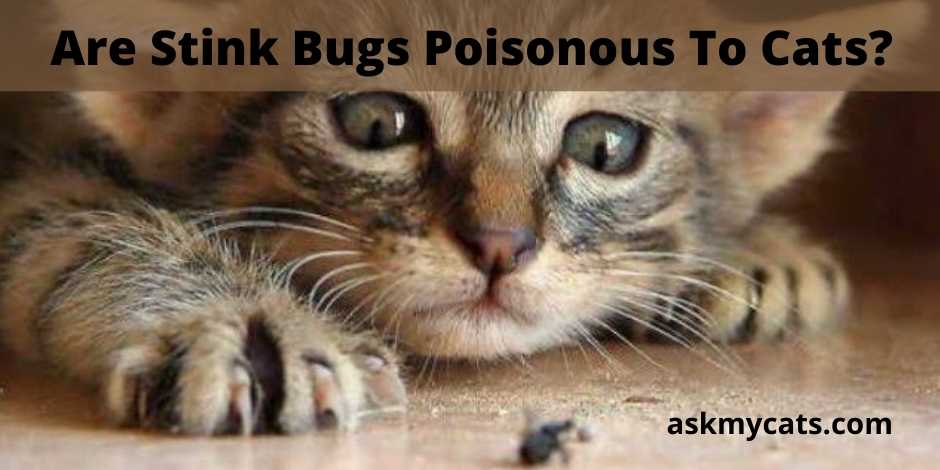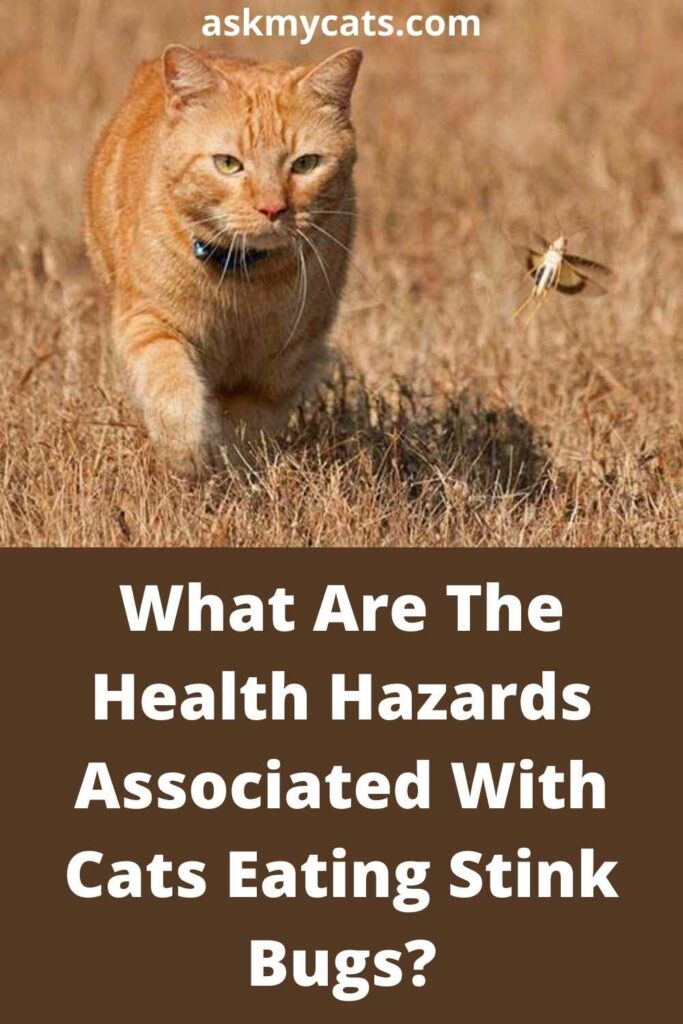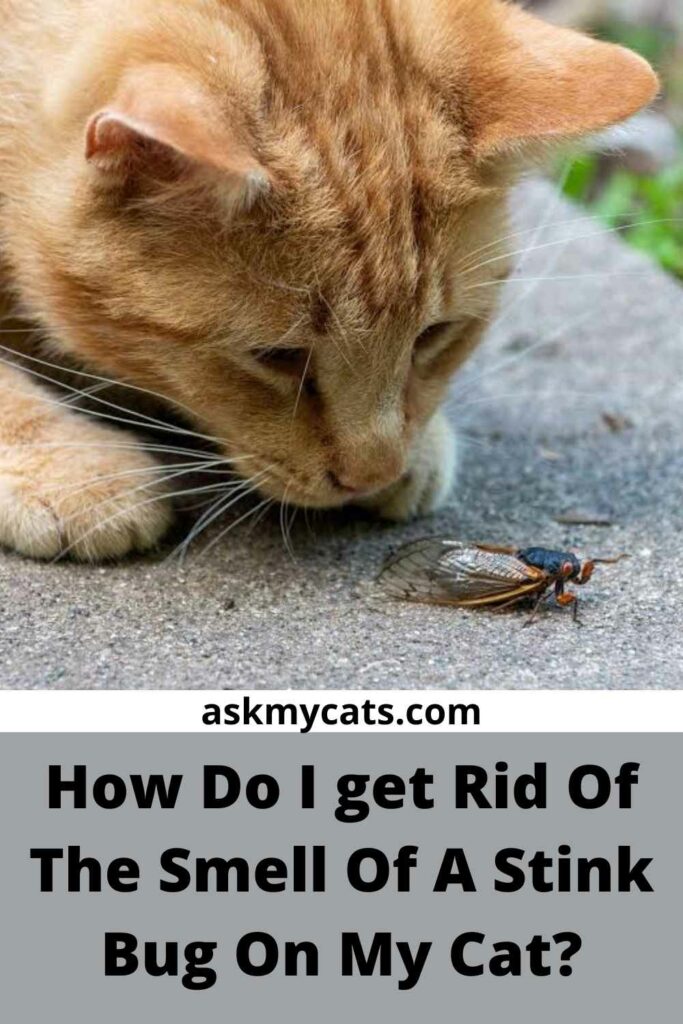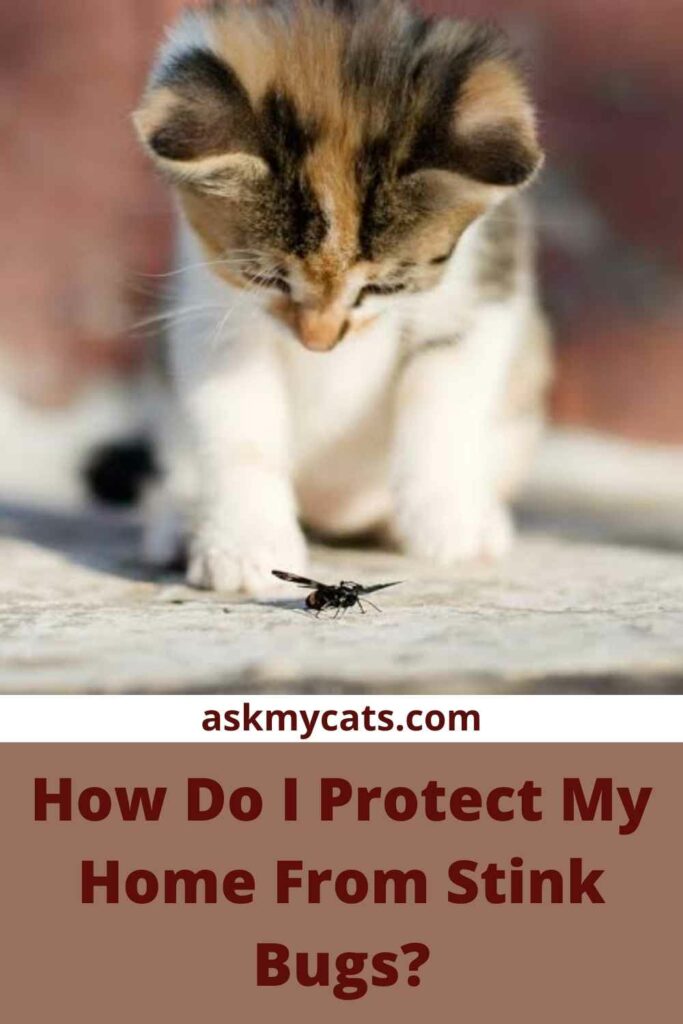We’ve all experienced the annoyance of stink bugs. The brown, shield-shaped bugs usually manage to sneak their way inside your home through gaps or holes and immediately settle in.
In the fall, they can even invade in huge numbers in search of milder temperatures. They generally lurk in the walls or attic until spring, when they emerge to live in your home.
The most common reason homeowners dislike stink bugs is because of their foul odor, but many people question if they should be concerned about these pests for other reasons.
Many cats love hunting and eating stink bugs. Pet owners are concerned that this may be harmful to their four-legged companions.
Stink bugs, thankfully, are not poisonous to cats. can, however, induce excessive vomiting or drooling in cats due to gastrointestinal irritations.
However, you shouldn’t be concerned because these symptoms should go away on their own.
If your cat consumes a lot of bugs, a hard mass called a bezoar can form in the stomach and prevent it from passing down the digestive track.
The mass may need to be removed surgically. If you believe your pet has eaten an excessive amount of bugs, you should see your veterinarian.
In this article we will elaborate on the relationship between stink bugs and your cat, so keep reading!


Give Your Cat the Perfect Day
Get the Free Ebook!
Why Does My Cat Eat Stink Bugs?
Your cat may not appear to be a predator, with her adorable face and laid-back temperament, but she is. Because you take such wonderful care of her, she might not get much experience in hunting.
However, when the opportunity arises, she will gladly accept the duty of hunting for prey. The stink bug is the prey in this scenario.
Cats consume stink bugs and other insects because they consider them prey. Cats are predators, and when the chance arises, they will exploit their natural abilities.
Cats don’t always consume insects and other tiny animals. These little creatures are targets for them, which they must chase, hunt down, and consume on occasion.
Fortunately, the majority of animals seen in a typical home are harmless. The majority of stink bugs are non-toxic, therefore your cat is safe.
Can A Stink Bug Hurt My Cat?
Stink bugs are not poisonous to cats or other pets in your home, despite their unpleasant stench. Ingesting these bugs, however, might cause gastrointestinal issues.
If your cat eats this stinking insect, her tongue, mouth, and lips may become inflamed as a result of the stink bug’s secretions. Ingestion of a stink bug can cause irritation of the eyes, drooling, vomiting, and other gastrointestinal issues in certain dogs.
Fortunately, most of these symptoms go away within a few days.
However, if a cat eats a lot of insects, especially stink bugs, she may develop a hard mass within his stomach called bezoar.
Your cat may be unable to pass the bezoar out of his body after the mass has grown to a significant size. The only thing left for her to do is go under the knife.
Therefore, as a pet-parent, you should keep an eye out and make sure that your cat does not consume too many bugs.
Can Cats Eat Stink Bugs?
Cats will occasionally pursue, capture, and consume different bugs such as grasshoppers, crickets, termites, flies. This covers stink bugs as well.
Yes, cats can eat stink bugs. However, you should not be concerned if your cat ate stink bugs because they are not toxic to cats or canines.
Their secretions, on the other hand, may irritate this pet’s oral lining which includes tongue, lips, and gums as well as the gastrointestinal tract.
As a result, your cat may drool, vomit, and display indications of gastrointestinal distress. After some time, the majority of these symptoms will go away on their own.
Furthermore, most cats are unlikely to eat them due to their unpleasant flavour. They may kill them, but they will not eat them. These pets only catch and eat insects on extremely rare occasions.
Finally, pesticides that are frequently sprayed on these insects include chemicals that are harmful to these animals. Make sure your cat doesn’t eat any that have been drenched in pesticides.
Do Stink Bugs Taste Bad To Cats?
If you’ve ever been too near to a stink bug, you’ll know what I’m talking about. As part of their defensive strategy against predators and dangers, they emit a terrible stench.
They emit a terrible odor that stinks up the neighbourhood. They spray a scent that may reach a few inches and stay for hours.
Although each stink bug has a distinct stench, it is meant to keep cats away. Because the flavor of stink bug is similarly unpleasant, a cat is unlikely to consume another stink bug.
Because stink bugs are so unpleasant, some pet owners encourage their cats to catch and destroy them, which many cats gladly do. As a result, cats’ willingness to consume stink bugs is determined by their personality and surroundings.
Do Stink Bugs Bite?
No, stink bugs don’t bite.
They are capable of causing damage to crops and plants by nibbling on them, but they do not bite cats or humans.
If they do bite, it isn’t hard enough to cause any harm or be seen. The stench they emit is far worse than any bite they might provide.
What If My Cat Ate A Stink Bug?
Stink bugs are characterised by their foul-smelling stink, which serves as an effective protection against predators. As a result, some pet owners are afraid that eating a stink bug would poison or damage their feline companion.
Cats aren’t poisoned by stink bugs, but their secretions might cause vomiting and diarrhea. Their rough exoskeleton rubs against the digestive tract, causing stomach discomfort.
If a stink bug secretes in a cat’s mouth, ulcers and sores may develop. Stink bugs, on the other hand, are high in protein, fat, flavonoids, and potassium.
Insects are a component of a cat’s diet, especially if it’s wild. Stink bugs are naturally attracted to cats with strong hunting instincts. Most cats, on the other hand, are just interested in capturing and playing with them.
Is It Safe For Cats To Eat Stink Bugs?
Although seeing your cat consume something that isn’t food is unsettling, you shouldn’t be too concerned if your cat captures and tries to eat a stink bug that has invaded your home. Cats, for the most part, are unaffected by the bug.
Cats are not harmed or poisoned by these bugs, so don’t be alarmed if you notice yours eating them. A feline’s instincts to hunt for moving, flying, or crawling tiny creatures, such as flies and other bugs, will be aroused, and they will begin pursuing them.
To ward off their different predators, stink bugs have generated foul-tasting and smelling secretions, as we’ve already mentioned.
As a result, most cats will attempt to eat them once they have captured them, only to abandon them owing to the secretions irritating their lips, mouth, and tongue.
In addition, if they eat and consume too many of these insects, they may have gastrointestinal discomfort, vomiting, and even diarrhea. These symptoms should not be concerning you because they will fade away in about a half-day, indicating that they are self-limiting.
If your cat consumes a lot of shield bugs, you should be aware that their scutellum (hardened shield) is not be edible. This will exacerbate the issue and may result in obstructions in the digestive tract of this animal.
In severe situations, such obstructions might be problematic and necessitate surgical removal.
Finally, because certain species of the Pentatomoidea superfamily are considered agricultural pests, pesticides and insecticides may be employed to eradicate or control them.
Obviously, your cats may be harmed if they eat foods that have been treated with these insecticides or pesticides.
Can A Cat Get Sick From Eating A Stink Bug?
Cats are not harmed by stink bugs. However, if your feline companions consume these insects, they will experience gastrointestinal distress.
The bug’s exoskeleton rubs against digestive systems. Furthermore, such exoskeletons might become lodged in the cat’s throat when he consumes the insect. As a result, cats will cause discomforts such as coughing and choking.
Regrettably, there are still exceptions. Some varieties of stink bugs are not as innocuous as others. By biting your small pals, they make them sick with serious digestive problems.
It’s not easy to keep your pets safe from dangerous pests. The most you can do is to keep stink bugs away from your feline companions as much as possible.
What Are The Health Hazards Associated With Cats Eating Stink Bugs?
Stink bugs may be harmful to one’s health, especially if consumed in big amounts. Your cat may acquire the following health problems if she consumes too many stink bugs:

1. Gastrointestinal Irritation
Stink bugs or shield bugs are noted for their strong exoskeletons, as their other name indicates. Although ingesting one will not kill your cat, it may irritate the gastrointestinal tract as it passes through, causing your cat to vomit and drool excessively.
If your cat consumes too many shield bugs, it may suffer from the following symptoms:
- Diarrhea
- Nausea
- Lethargy
- Pain in the abdomen
Your cat’s mouth and stomach are likely to be irritated by the stinky secretions. When the fluid comes into contact with their mouth, tongue, or lips, they will immediately feel the effects.
While some cats may try to eat the shield insect, the secretions will most likely lead the animal to drop the bug and leave the search.
If a cat is infected, the symptoms should go away on their own in eight to twelve hours without any medication. Owners must, however, keep an eye on them for any signs of illness.
2. Bezoars
The scutellum, or hard outer shell, of a stink bug isn’t always edible. A bezoar forms in the body of your cat if it eats a lot of bugs. A foreign body produces a mass in the gastrointestinal tract.
Some are naturally vomited out, but because to the toughness of the shells, the majority become trapped in the stomach, forming a hard, spherical mass.
When a bezoar becomes too big, it can only be removed surgically. The following are symptoms of a bezoar:
- Appetite loss
- Weakness
- Lethargy
- Diarrhea
- Pain in the abdomen
When you touch your cat’s abdomen, you could detect a firm lump.
3. Eye Damage
A cat’s eyes are vulnerable because some stink bug species may spray their poisons many inches. It is unlikely that the discharge would cause blindness or visual loss, but it will hurt.
It may also have a short-term negative impact. The following are signs that your cat is suffering from eye pain:
- Watery eyes
- Grabbing the eyeball
- Redness
- Inability to open the eye that is affected
If your cat has been stung by a stink bug, clean her eye with a saline solution and a moist towel to eliminate any discharge.
If the eye does not clear up on its own, take your cat to the veterinarian. Antibiotic drops or anything similar may be required to alleviate the inflammation.
Swollen eyes, on the other hand, are a symptom of infection or serious irritation and require veterinarian attention.
4. Pesticides
Shield bugs are pests in the agriculture industry. They wreak havoc on crops and munch on fruit, making life difficult for farmers who must apply pesticides to keep the shield bugs at bay.
As a result, there’s a considerable chance that your cat will ingest toxic compounds that will make it sick if it eats stink bugs.
The indications of a poisoned cat are as follows:
- Tremors
- Twitching
- Pain in the abdomen
- Pupils that are dilated
- Drooling excessively
- Seizures
- Vomiting that is severe
- Breathing that is laboured
- Appetite loss
If your cat has been poisoned by pesticides, you should take them to the doctor as soon for treatment. Cats suffer long-term consequences if the problem is allowed to worsen.
Are Cats Allergic To Stink Bugs?
Stink bugs are seldom allergic to cats. However, their defence mechanism induces illness and diarrhoea, giving the impression that the cat is allergic to stink bugs.
If sprayed in the mouth or face area, the excretion of a stink bug might irritate a cat’s sinuses. An irritated tongue and itchy eyes are other frequent allergy symptoms.
An allergy might also cause the following symptoms:
- Itchy, runny eyes
- Itchy, runny skin
- Appetite loss
- Sneezing
- Coughing
- Paws that are swollen
- Stomach ache
As a result, your cat is more likely to be reacting to the stink bug’s fluid rather than the insect itself.
How Do I Get Rid Of The Smell Of A Stink Bug On My Cat?

There are several options for getting rid of the stink bug odor on cats.
A combination of hydrogen peroxide, baking soda, and dishwashing solutions is often recommended. Two cups boiling water, one cup white vinegar, and half cup dish soap should be mixed together in a spray bottle.
Directly spray the solution on the pests. The remedy will eliminate the stink bug odor your cat.
Other home treatments for removing and getting rid of stink bug odor on your cat are:
1. Vanilla Extract And Water
To eliminate and get rid of the stink bug stench on your cat or dog, mix a cup of vanilla essence with a gallon of water. Allow ten minutes for your pet to soak in the solution. The pet shampoo can then be applied and rinsed off.
In the same method, you may use hydrogen peroxide and tomato juice.
2. Apple Cider Vinegar And Water
A combination of two parts water and one part apple cider vinegar will be required for vinegar use. The volume and dimensions will be determined by the size of your cat.
To begin, moisten the cat with regular water. After that, apply the vinegar solution to the fur, let it soak for about three minutes, and then rinse completely. Please keep the mixture away from your cat’s eyes while using it.
The cleaning effects of Apple Cider Vinegar Capsules may be traced back to the Ancient Egyptians. It’s made by mashing pure fermented apples with yeast and bacteria in a blender.
How Do I Protect My Home From Stink Bugs?

Stink bugs are attracted to people’s houses because they are looking for a warm place to stay throughout the winter. This generally happens in the fall when the weather starts to cool down.
Stink bugs, on the other hand, may infest a house in frighteningly huge numbers and can be extremely difficult and inconvenient to eradicate.
If you want to keep these insects out of your house and avoid another interaction between your cat and stink bugs, make sure you follow these instructions:
1. Close All Entry Points
Inside and outside your home, seal doors, windows, and cracks. Stink bugs need just only a little amount of room to enter your home.
Examine your property for probable entrance points, like as cracks in the wall and holes in the screen door, before autumn arrives.
Examine utilities, chimneys, baseboards, exhaust fans, and trim for cracks. Caulk or weather strips can be used to seal these gaps.
2. Limit Use Of Outdoor Lights
Light is commonly used to attract stink bugs. Also, if you have exterior lights on your property, turn them off as much as possible.
To prevent interior light from seeping outside, consider putting shades or put up thick drapes on your windows.
3. Eliminate Potential Water Sources
All of these things, from leaking pipes to water gathered in abandoned pots, might bring pests to your home. If at all feasible, get rid of these.
4. Remove Stink Bug Eggs
In your garden, look for egg masses and kill them. On the underside of leaves, their pale yellow, elliptical eggs are found in clusters.
5. Keep Your Home Clean
Cleaning up around the house will help to decrease clutter, which may be a breeding ground for stink bugs.
Although stink bugs are generally dormant throughout the winter as they wait for the weather to warm up, it is not uncommon to find some of these insects wandering into kitchens looking for food.
Allowing these pests to eat for free is not a good idea. Make careful to clean your home, particularly the kitchen, to eliminate potential food sources such as crumbs and leftovers.
6. Purchase A Dehumidifier
Stink bugs prefer to hide in basements, garages, attics, and other similar areas. By using a dehumidifier to dramatically reduce humidity, you can deter these pests from migrating into these locations.
7. Get Rid Of Stink Bugs Using Vacuum
Use a vacuum cleaner instead of squishing these pests. This will make it easy for you to trap these pests and reduce the risk of their escaping.
If you encounter stink bugs in your house, suck them up with a an old vacuum cleaner to keep them from producing their terrible odor. Use caution while using your regular vacuum cleaner, since the bugs’ stink may remain in the vacuum.
Frequently Asked Questions
Can A Stink Bug Hurt My Cat?
In the sense that they won’t bite or sting your cat, stink bugs are largely harmless. Therefore, you don’t need to worry for your feline.
What Is The Best Stink Bug Killer?
A simple mixture of hot water, dish soap, and white vinegar is recommended as an efficient stink bug trap.
What Does Stink Bug Smell Like?
The scent varies depending on the species and the individual’s olfactory capabilities, but it has been compared to strong herbs and spices such as cilantro and coriander.
Final Words
While most bugs are harmless to your cats, you should be aware that others, such as fireflies, are deadly to them.
Even if you overlook the issue of stink bugs and cats, you should be aware that some insects are disease carriers. Additionally, some may aid in the transmission of certain intestinal parasites to your cats.
As a result, if at all possible, prevent any of your pets from eating them.
Drop down your queries regarding your furry little friend in the comment section below. We will answer them soon!
